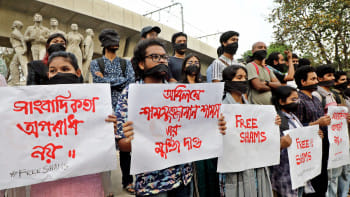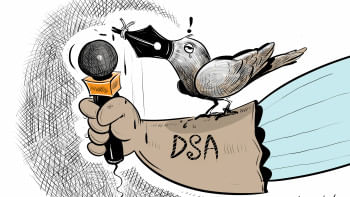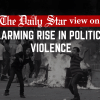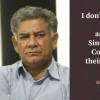DSA and the quest for an obliged press

The use of the Digital Security Act (DSA) to target journalists in Bangladesh is deeply concerning and goes against the principles of free journalism and freedom of expression. A free and independent press is essential for any democratic society, and journalists must be allowed to report on issues of public interest without fear of retaliation or censorship.
The use of DSA to suppress critical reporting is particularly troubling as it can be interpreted broadly and lead to the criminalisation of legitimate journalism. This not only stifles press freedom, but also undermines the ability of citizens to access accurate and timely information, which is essential to hold governments and other powerful actors accountable.
The recent case filed against Prothom Alo Editor Matiur Rahman and the arrest of its reporter Samsuzzaman Shams are examples of the harassment and intimidation that is being used to curb bold journalism by the newspaper. The case must be withdrawn, as with all cases filed against journalists under the DSA.
The law minister has talked about amending the DSA to prevent its misuse, and also promised that the law won't be used arbitrarily against journalists. However, cases are still being filed against journalists under this law, which is a clear threat to the freedom of press. Samsuzzaman was sent to jail after his bail petition was rejected initially (he was granted bail in one of the cases against him on April 3). Filing cases under the DSA one after another is a significant blow to the country's newspaper industry and freedom of expression.
It is unacceptable that Samsuzzaman Shams was missing for 30 hours after being taken into custody and before being presented in court. The law stipulates that a person who is lawfully detained must be produced before a court within 24 hours; the law enforcement agency that detained Shams clearly failed to adhere to this requirement.
There have been worrying incidents of violence and intimidation against journalists reported recently, such as attacks on reporters covering the Supreme Court elections, an assault on the brother of a journalist of Al-Jazeera, an attack on a photojournalist of Dhaka Tribune. These events demonstrate a concerning trend that poses a threat to the safety of journalists. It is essential to denounce such acts of violence and ensure that journalists are protected when carrying out their critical work.
Arrests of and criminal proceedings against journalists in any country warrant particular scrutiny and attention. The authorities should investigate each of these instances promptly and impartially if they truly believe in the rule of law, democracy, and freedom of the press.
It is unacceptable that Samsuzzaman Shams was missing for 30 hours after being taken into custody and before being presented in court. The law stipulates that a person who is lawfully detained must be produced before a court within 24 hours; the law enforcement agency that detained Shams clearly failed to adhere to this requirement. Moreover, it is concerning that the case for which the reporter was brought to court was filed more than 20 hours after he was initially apprehended.
These actions raise serious questions about the treatment of detainees and adherence to legal protocols, and it is imperative that they are investigated thoroughly to ensure that such violations don't occur again in the future.
If any media outlet publishes a report that goes against the ethics of journalism, aggrieved parties should address their concerns through the Bangladesh Press Council. The direct arrest of a reporter under non-bailable sections of the DSA without regard for the Press Council demonstrates the government's intention to exert control over the media and punish those who express criticism or dissent.
It is pertinent to mention that the Bangladesh Press Council is a statutory body established under the Bangladesh Press Council Act, 1974, with the mandate to promote and maintain freedom of the press, improve journalistic standards, and adjudicate complaints against newspapers and news agencies.
Sadly, the council is largely seen as being ineffective in addressing cases of media censorship, harassment, and violence against journalists. Many journalists and media organisations have criticised the council's slow and bureaucratic procedures, as well as its perceived bias towards government interests.
The self-styled ineffectiveness of the Press Council has created a regulatory void in the media landscape, leaving journalists and media outlets vulnerable. This has led to a chilling effect on the media, with journalists increasingly facing intimidation and harassment, and media outlets self-censoring to avoid government reprisals. Strengthening the Press Council and ensuring its independence from government influence is essential to creating a more conducive environment for free and independent journalism in Bangladesh.
As the 12th parliamentary election in Bangladesh is less than a year away, it is crucial for the government to uphold journalistic pluralism and independence. Failure to do so will undermine the democratic legitimacy of the election.
The arrest of Samsuzzaman Shams and the case filed against Matiur Rahman reflect a broader pattern of media crackdowns in Bangladesh. The arrest of Shams also violates his constitutional right to safety as a citizen and sets a negative example of media control and punishment.
The increasing use of the DSA against journalists is concerning. The cases filed against journalists under the DSA must be withdrawn, and repressive laws like the DSA act must be abolished to uphold the freedom of mass media and expression.
Bangladesh successfully qualifies the definition of "Hybrid Regime." The last remaining resistance is the "Partly Free" press. Does the state want an obliged one?
Meer Ahsan Habib is a Hubert Humphrey Fellow at Arizona State University. His Twitter handle is @meeriyadh

 For all latest news, follow The Daily Star's Google News channel.
For all latest news, follow The Daily Star's Google News channel. 











Comments